NEW YORK CITY: On their first official visit to Saudi Arabia since the Yemen war erupted in 2014, a delegation of Houthi rebels held talks in Riyadh over a five-day period last week on a potential agreement that could hasten the end of hostilities.
Progress has been reported on many of the main sticking points, including a timeline for foreign troops to leave Yemen, and a mechanism for paying public servants’ salaries. A full reopening of Houthi-controlled ports and Sanaa airport, along with reconstruction efforts, was also among the issues discussed.
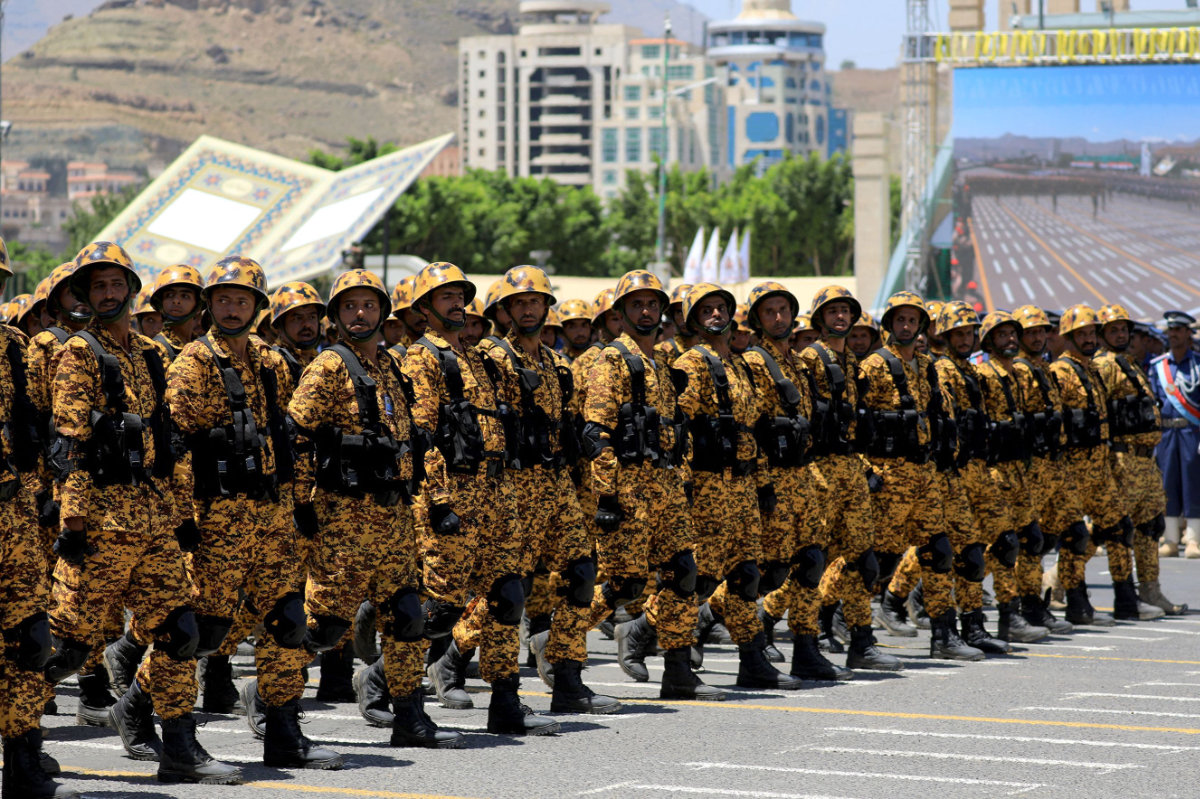
Houthi soldiers march during an official military parade in the Yemeni capital, Sanaa, on September 21, 2023. (Mohammed Huwais/AFP)
Antony Blinken, the US secretary of state, praised the meetings — the highest-level, public negotiations with the Houthis in the Kingdom in the past nine years — as “a moment of opportunity.” The Saudi government “welcomed the positive results of the serious discussions.”
But despite the general decline in violence in Yemen, UN officials have cautioned that the situation on the ground remains “fragile and challenging” and “the front lines are not silent.”
According to Timothy Lenderking, the US special envoy for Yemen since February 2021, Washington is working tirelessly to end the conflict, which has killed and maimed hundreds of thousands, and left 80 percent of Yemen’s population dependent on humanitarian aid.

Tim Lenderking
“I am 24/7 on Yemen. Yemen is my goal. It is my heart’s mission. It is my team’s mission,” Lenderking told Arab News in an interview in New York City on the sidelines of the 78th session of the UN General Assembly.
“It’s the (Biden) administration’s mission to see that this terrible war, which has displaced and killed so many people and distracted the region, can be brought to a close in a just and comprehensive manner.”
Although the past year has been marked by both humanitarian challenges and de-escalation in Yemen, Lenderking, a career diplomat whose official title is deputy assistant secretary for Arabian Gulf Affairs, has generally voiced optimism since the internationally recognized Yemeni government and the Iran-backed Houthi rebels reached a truce agreement in April 2022.
Last year on the sidelines of the 77th General Assembly, a few months after the truce came into effect, he told Arab News that the benefits accruing to the Yemeni people had opened the door for a durable ceasefire to be agreed in the following months.
FASTFACTS
Tim Lenderking said meetings held by US Secretary of State Antony Blinken on Yemen show the international community’s determination to move the peace process forward.
Saudi Defense Minister Prince Khalid bin Salman reaffirmed the Kingdom’s “commitment to promoting dialogue among all parties” when he met Houthi negotiators during their recent five-day visit to Riyadh.
“My optimism last year was not misplaced because after the truce we have continued in a period of de-escalation that has lasted 18 months, with no cross-border attacks,” Lenderking said.
“Recall the pace and the fury of those attacks in the earlier days of the war, including more than 400 attacks from Yemen in 2020. The commercial capital’s airport, Sanaa, has been open for commercial flights. Those have expanded from three to six per week.”
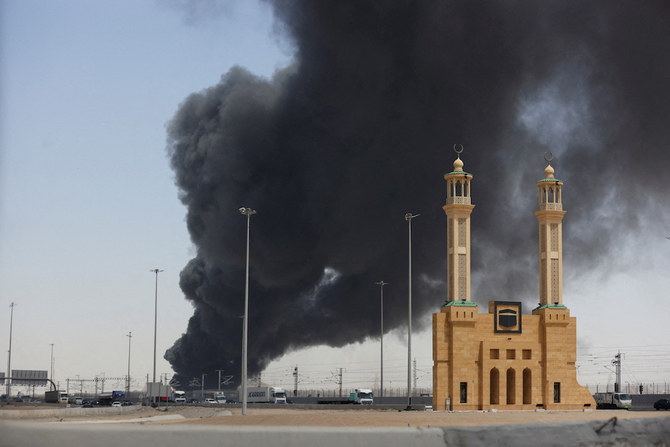
Smoke billows from a Saudi Aramco's petroleum storage facility after an attack in Jeddah on March 26, 2022. (Reuters/File)
Lenderking described the development as “a drop in the bucket,” but added that “it still represents good progress and tangible benefits” for the Yemeni population.
“After all, these are two sides who have been fighting intensely for the past several years. And to have them talking and visiting and spending days in each other’s capitals is a very important development,” he said.
“No one’s saying there is a breakthrough, but it appears that these contacts were positive enough that they will continue. We are very keen to see them drive to positive results, begin to untangle the distrust that has prevailed. They are going to have to live together eventually.”
He added: “The considerable efforts that have been exerted very positively between Saudi Arabia and the Houthis, that needs to transition to the UN-led process. We want to move beyond the current truce — which is very positive but not enough — into a durable ceasefire and Yemeni-Yemeni political talks.
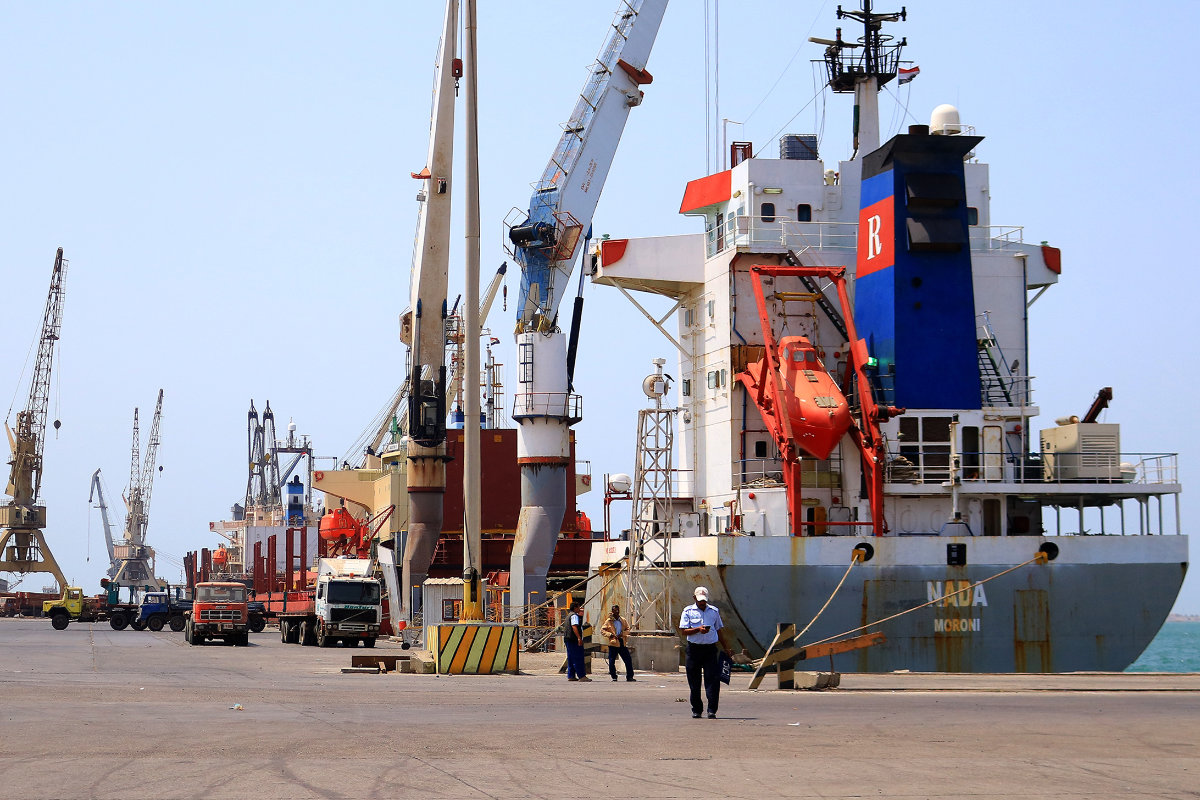
Ships are docked for unloading in the Yemeni port of Hodeida on March 5, 2023. (AFP)
“This is how Yemen’s future gets decided. Not by the outside powers. Not by one party in Yemen dictating to another. (It) has to be an inclusive Yemeni-Yemeni process. And there is an international consensus behind this and supporting it.”
Lenderking said that the presence of Rashad Al-Alimi, chairman of the Presidential Leadership Council, in several meetings involving the US and the P3 (the three permanent members of the Security Council: US, UK and France), underscored the strong signals of international support for his leadership.
All these factors provide reason to believe that with international backing, progress toward a UN-led initiative and Yemeni-Yemeni dialogue is possible in the near future, he said.
(At the UNGA general debate on Thursday, Al-Alimi urged the international community to do more to stop the flow of arms and resources to the Houthis, and warned that “the institutions of Yemen will not have the necessary resources to deal with these cross-border challenges” if funds are not directed to recognized governmental financial institutions.)
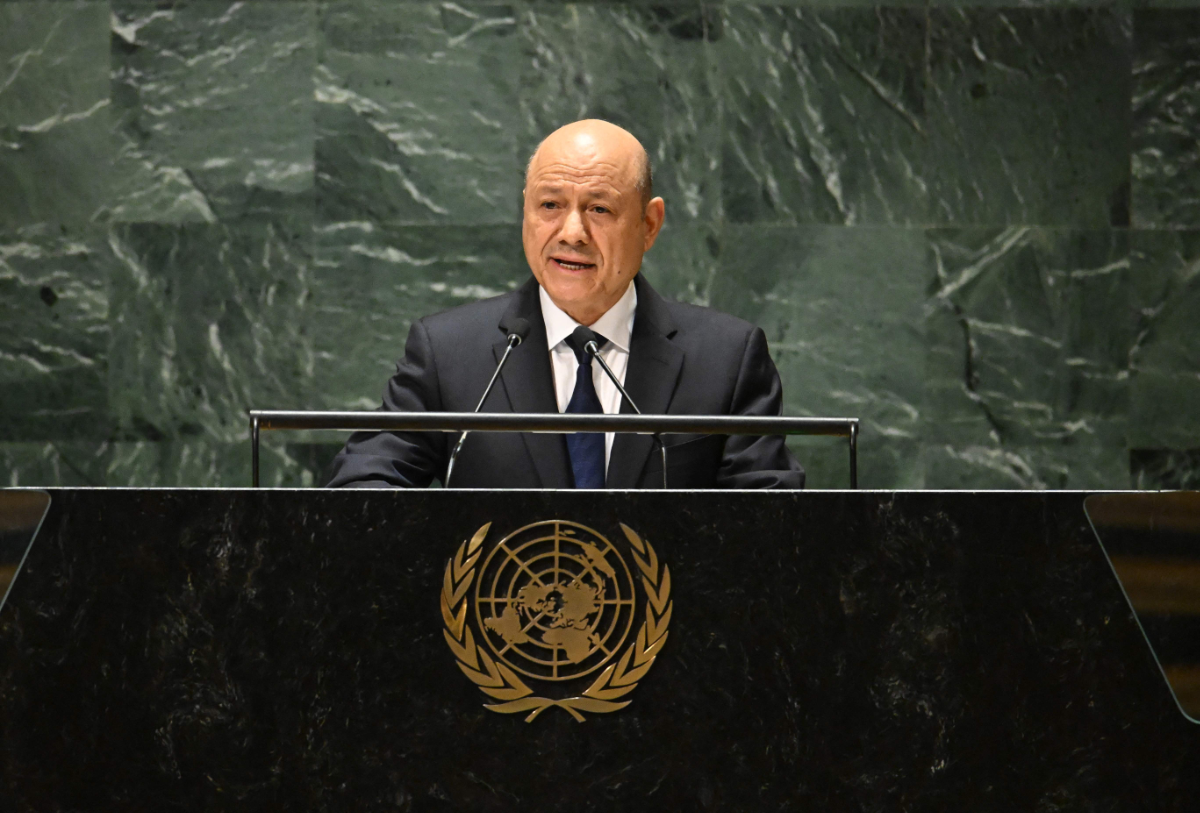
Rashad Mohammed Al-Alimi, chairman of Yemen's Presidential Leadership Council, addresses the 78th United Nations General Assembly at UN headquarters in New York City on September 21, 2023. (AFP)
Asked whether the Saudi-Iran rapprochement played a role in bringing the warring Yemeni parties to the present point, Lenderking said that much of the groundwork that was done to achieve and maintain the truce was well in motion even before the Chinese-brokered deal between the two Middle East powers was announced on March 10 this year.
“What we are looking to see from the Saudi-Iran deal is whether Iran’s posture toward Yemen has changed. Is it moving away from smuggling lethal weapons and aid for the Houthis that fueled the war effort, violating Security Council resolutions? And is Iran going to support a political solution?” Lenderking said.
“We hear that they are moving in this direction. We have seen some positive public statements from Iran. A new posture from Iran toward Yemen supporting the positive trajectory would be well received by the United States.”
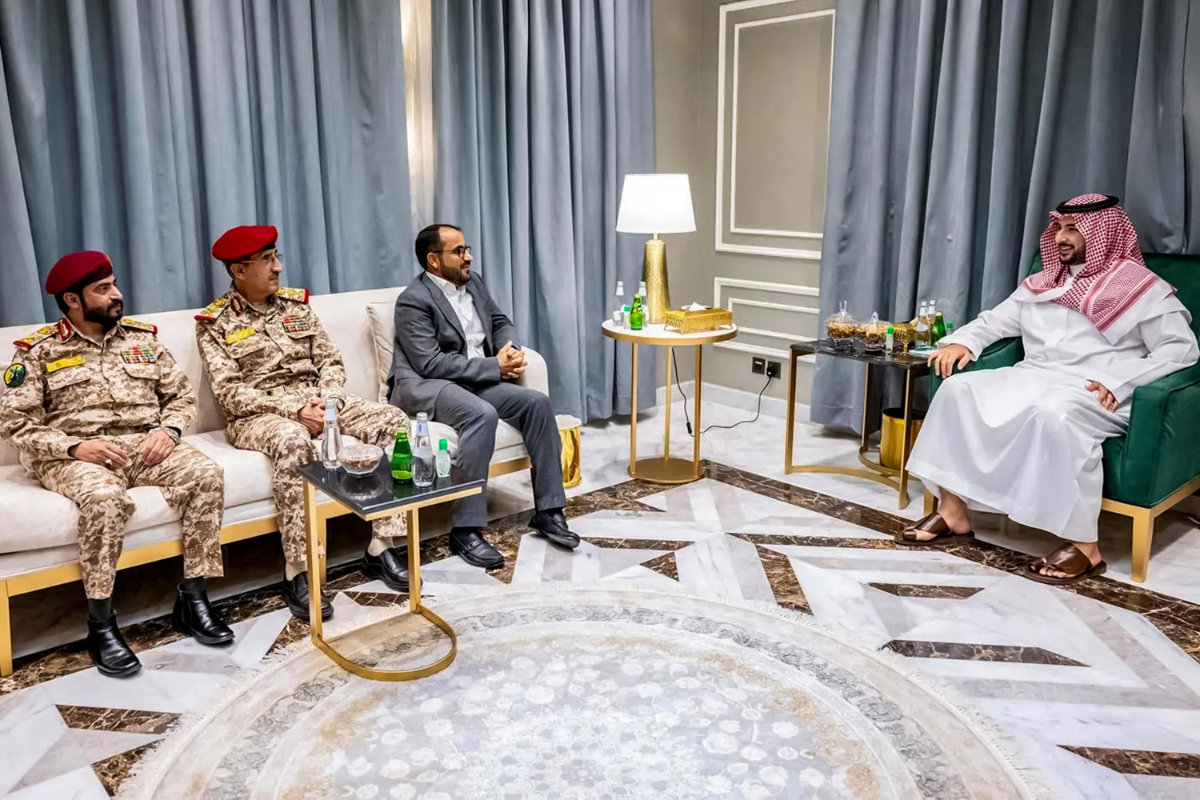
Saudi Arabia's Defense Minister Prince Khalid bin Salman (R) meeting with a delegation of Yemen's Houthis in Riyadh last week. (SPA)
The fact that the Houthis have chosen not to resume hostilities despite the lapse of the truce is of great significance, Lenderking said, adding that this could point to a change in the Houthi mindset while the extended phase of de-escalation continues.
He believes the group has demonstrated a refreshing willingness to release detainees and engage in discussions with the opposing party in the context of military committees.
This level of engagement “was not happening at this pace throughout the entirety of the war; this is the best opportunity for peace that Yemen has had since this war broke out almost 10 years ago. And that’s why US efforts are so energetic and so vigorous at this point,” he said.
“Here in New York City, Secretary Blinken (had) at least three meetings that focused on Yemen while he was here. Bear in mind the (extensive list of topics on the) international agenda in New York: climate, Russia-Ukraine, other humanitarian considerations. So, Yemen is getting some time here among world leaders, which we think is very positive.”
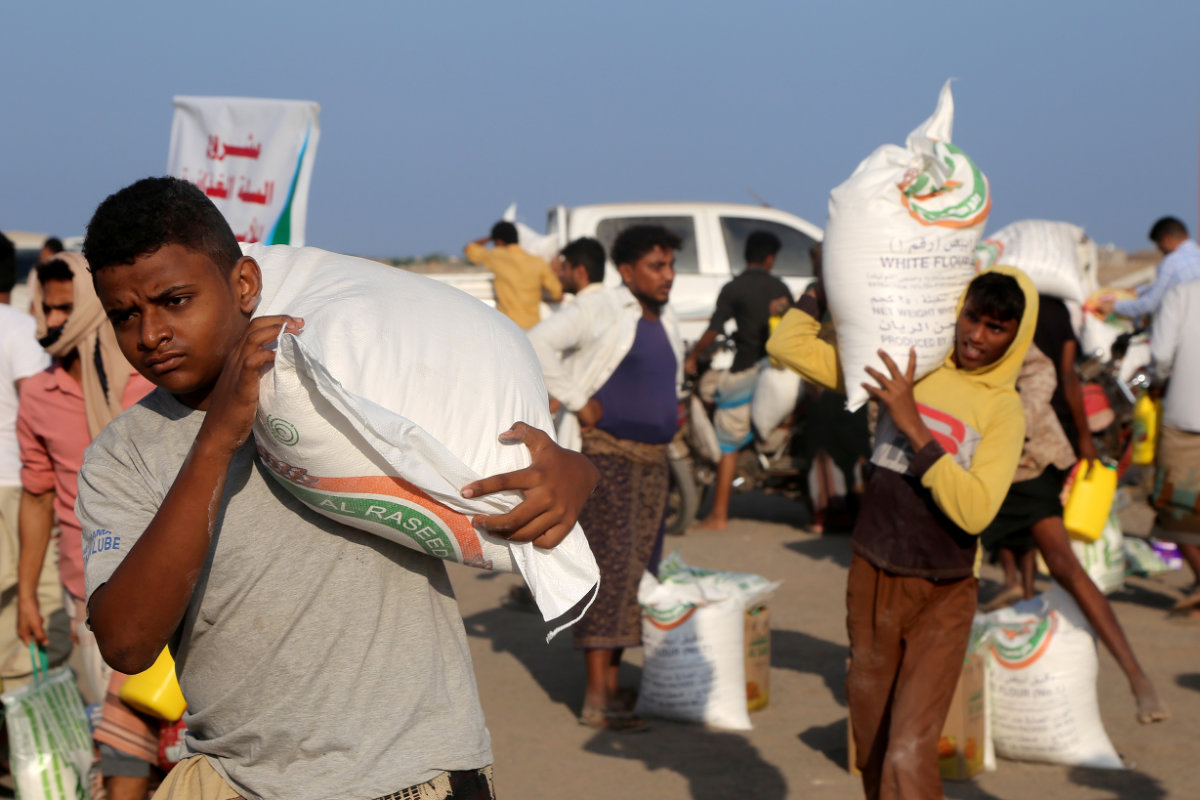
Displaced Yemenis receive sacks of food aid supplies at a camp in Hays district in the war-ravaged western province of Hodeid on April 20, 2023. (AFP)
Although diplomatic channels between the US and Russia have been all but cut off since the invasion of Ukraine in February 2022, there is no disagreement among the P5 on the way forward in Yemen.
The P5 are united on the need for a political solution, and this unity is a “great asset for us to have,” Lenderking said.
“The Security Council has shown considerable unity, a strong support for (Special Envoy of the Secretary General for Yemen Hans) Grunberg’s efforts, support for (the) humanitarian crisis. This is a blessing. We really have to take advantage of the fact that there is this united positioning between key players.
“We don’t take anything for granted when it comes to support for peace in Yemen. We have to work toward solutions. We have to be very, very aggressive about maintaining what progress we make.”
One of this year’s notable success stories of the multilateral system also has to do with Yemen. The threat of a massive oil spill in the Red Sea had been averted, after more than a million barrels of oil were transferred to a salvage ship from the Safer tanker, a decaying storage vessel that had been moored off the coast of Yemen for years and described as a “ticking time bomb.”

Technicians work on the deck of the replacement vessel as the transfer of oil from the decaying FSO Safer oil tanker began off Yemen on July 25, 2023. (Reuters/File)
“I think it is an incredible story because (of) an unlikely coalition of private sector, including oil companies, national governments, and a crowdfunding effort that tapped into individuals around the world. School kids in Bethesda, Maryland, sold lemonade because they got swept up by the environmental consequences of this oil spill had it happened,” Lenderking said.
“And it’s kind of a model for cooperation because we worked together to avert a problem before it became a crisis. That doesn’t happen very often on the world stage. Here in New York, nearly every conversation is about something that has happened already and needs to be dialed back. So, this was a terrific effort.”
On the downside, Yemen continues to be one of the world’s biggest humanitarian crises. In 2023, 21.6 million Yemenis require some form of humanitarian assistance as 80 percent of the population struggles to put food on the table and access basic services. The UN has appealed for funding, with only 30 percent of the target having been met so far.
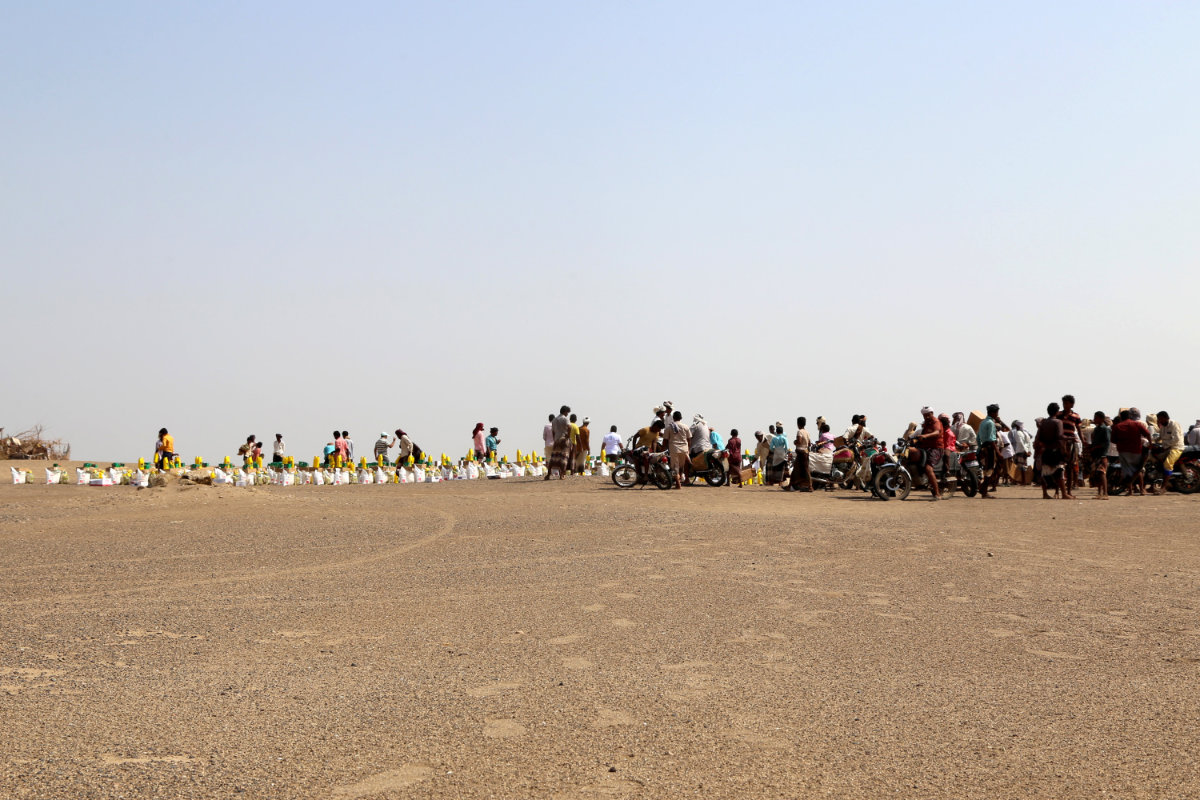
Yemenis displaced by the conflict receive food aid and supplies to meet their basic needs at a camp in Hays district in the war-ravaged western province of Hodeida on August 31, 2022. (AFP)
“Yemen’s economy has been in ruins. The country’s economic capacity has to be revitalized,” Lenderking said. “I think there’s eagerness to do this. We are in regular contact with the international financial institutions ... IMF, World Bank. And then there’s the distrust that has to be worked at through the kind of personal engagement that we’re seeing between the parties that until recently were shooting at each other. They are talking now.
“Now, the common outcome and objective must be peace: a peace agreement, threading together these various positive strands and pushing them with international support under UN leadership. It ultimately falls to the UN to put a roadmap together, capitalize on all of this positive movement and drive it toward Yemeni-Yemeni negotiations.”














